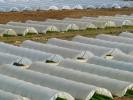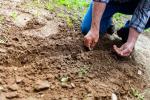H2020 ALL-Ready Project: European Network of Living Labs and Research Infrastructures in Agroecology: Preparation Phase
- Type Project
- Status Filled
- Execution 2020 -2023
- Assigned Budget 2.136.174,00 €
- Scope Europeo
- Main source of financing Horizon 2020
- Project website Proyecto ALL-Ready
A sustainable and ecological approach to agriculture is today a solution to the growing challenges of climate change, natural resource depletion, declining biodiversity, and diminishing soil quality. Agroecology can address these challenges by strengthening the resilience of agricultural systems. Existing instruments offered by open innovation mechanisms can contribute to this goal, particularly Living Laboratories (LLs) and Research Infrastructures (RIs).
Therefore, the EU-funded ALL-Ready project will develop AgroEcoLLNet, a new framework for the future European LL and IR network. The project will lay the groundwork and prepare the necessary prerequisites and activities. Testing will verify and improve the project results, which will be widely disseminated throughout Europe. The implementation plan will be tested and integrated into the validated AgroEcoLLNet framework.
A thorough literature review and an extensive co-creation process have resulted in the definition of key concepts, the vision, and mission of the network of living laboratories and research infrastructures for the agroecological transition, as well as a related document that provides definitions and a set of inclusion criteria for agroecology living laboratories, relevant research infrastructures, and their synergies. This work allowed for the creation of an online survey that allows potential network members to describe themselves according to the criteria defined by the project.
In this way, relevant initiatives were mapped, including barriers and facilitators of transition, and best practices (including funding) were identified. A second main outcome concerns the pilot network, composed of 20 living labs and research infrastructures that served as a testbed for the network's activities. Pilot network members worked closely with the leaders on capacity development, network implementation, and the virtual lab to jointly define needs and activities. The resulting implementation plan describes the network's added value, as well as key drivers and recommendations for its long-term, sustainable implementation. Furthermore, the capacity development program was co-created with the pilot network members, focusing on their needs.
In addition to three modules on "Understanding the Concepts of Living Labs and Co-creation," a specific session on systems thinking was designed at the request of the pilot network members. A final meeting also allowed them to provide feedback on the developed capacity-building program. A Virtual Lab was created, also based on the needs of the pilot network members. Finally, the project results were communicated and disseminated through the website, brochures, participation in international conferences and meetings, and through active participation in the SCAR Agroecology Strategic Working Group, which is developing the collaboration proposal. A joint ALL-Ready-AE4EU final conference attracted a large audience and presented the results of the two ASCs.
Given the multiple challenges facing the agricultural sector today, such as climate change, biodiversity loss, dwindling resources, and the degradation of soil and water quality, there is widespread recognition that business as usual is no longer an option. The European Green Deal sets ambitious goals for Europe, including zero net greenhouse gas emissions by 2050, decoupled economic growth from resource use, and ensuring that no person or place is left behind. The Green Deal will be implemented through specific strategies, such as the Farm to Fork Strategy and the Biodiversity 2030 Strategy, which consider agroecology as a sustainable practice and a means to reduce the use of pesticides, fertilizers, and antimicrobials.
Furthermore, within Horizon Europe, a new set of co-funded European partnerships is being developed, mobilizing resources from Member States, Associated Countries, and the European Commission, designed to generate societal impact. These include the initiative "Accelerating the Transition of Farming Systems: Agroecology Living Labs and Research Infrastructures" (AGROECOLOGY). In line with the Farm to Fork Strategy, this collaboration recognizes the urgent need to transform our agri-food systems. ALL-Ready is a Coordination and Support Action (CSA) funded by the European Commission with the aim of significantly contributing to future collaboration by preparing a framework for a future European network of living labs and research infrastructures to facilitate the transition to agroecology across Europe. The collaboration is based on the premise that agroecology can strengthen the sustainability and resilience of farming systems.
Furthermore, it assumes that user-centered living laboratories, operating under real-life conditions and with a co-creative approach involving a multitude of different actors, are particularly well-suited to accelerating this transition, supported by research infrastructures. Research infrastructures can be facilities for the transition to agroecology. They are dedicated to research communities and allow scientists to observe, experiment, and predict the redesign of agroecosystems and food agriculture. Together, they contribute to creating a body of scientific knowledge on agroecology available for the agroecological transition. The ALL-Ready project has defined, in a co-creation process, a conceptual framework that includes the vision and mission of a European Network of Living Laboratories and Research Infrastructures, designed to accelerate the transition to agroecology. A second achievement concerns the large-scale mapping, analysis, and review of existing mechanisms (in the EU and beyond) for participatory agroecological research and innovation, with the aim of implementing the network.
This involved defining a set of inclusion criteria for the network, exploring barriers and facilitators, including policies, for the transition to agroecology, examining funding mechanisms, preparing an inventory of European living laboratories and research infrastructures that can contribute to the transition to agroecology, and finally, identifying exemplary cases. A small-scale pilot network of 20 living laboratories and research infrastructures was established, allowing the network's functioning and activities to be tested. Together with the pilot network, guidelines for an implementation plan were designed, based on an iterative process of assessing the needs of potential network members. It also addresses how to ensure the network's long-term implementation and sustainability. In parallel, the ALL-Ready project has developed a capacity-building program that includes actions and training packages that were tested with the pilot network.
Finally, the project has provided evidence-based knowledge to support the transition to agroecology. Cross-cutting themes included stakeholder engagement at each stage of the project, communication and dissemination of project results, and the development of a virtual laboratory with information supporting the transition to agroecology.
Today, agricultural systems face multiple challenges, including climate change, biodiversity loss, resource decline, and soil and water quality degradation. Agroecology can strengthen the sustainability and resilience of agricultural systems and thus contribute to addressing these challenges. Based on the premise that Open Innovation Agreements (OIAs) and, in particular, Living Labs (LLs) and Research Infrastructures (RIs) are instruments with great potential to contribute to the amplification of agroecology in Europe, the main objective of ALL-Ready (this project) is to prepare a framework for a future European network of LLs and RIs (to be called “AgroEcoLLNet”) that will enable the transition to agroecology across Europe.
It will be based on a highly participatory and inclusive approach and on experimentation in real-life situations, thus utilizing a living laboratory approach. An underlying principle of the project is strong stakeholder engagement, which began with the preparation of this proposal.
The project has 3 phases:
- Initial preparatory phase in which the Network's vision, scope, and mission are defined, and criteria for inclusion in the Network for LLs and RIs, as well as other forms of OIAs, are defined. This will allow for mapping current and emerging LLs, RIs, and OIAs across Europe and their characteristics, highlighting the best cases.
- Prerequisites/activities for the future Network (sustainability, including financing, governance, capacity development, data and knowledge management). Plans for each will be developed with stakeholders, then tested in a small-scale pilot network and further refined to meet needs.
- The results of this work will be widely communicated throughout Europe through various mechanisms. One of the final project deliverables will be a pilot-tested implementation plan for implementing the validated AgroEcoLLNet framework within Horizon Europe.
As mentioned above, the extensive work within ALL-Ready has led to the definition of key concepts that serve as the basis for the future network. These concepts are based on existing literature, as well as extensive stakeholder input, and have enabled the development of a survey assessing the contribution to the agroecological transition and the maturity of relevant initiatives. These criteria have also enabled the mapping of living laboratories, research infrastructures, and other open innovation mechanisms, as well as the construction of a pilot network.
A pilot network with various living laboratories and research infrastructures has been built, which will be expanded during the AGROECOLOGY collaboration. The principles and activities for the future European network were co-created and tested within the pilot network, enabling the network's efficient and effective operation. In this way, the ALL-Ready project has significantly contributed to the European AGROECOLOGY collaboration and, at the same time, has contributed to the agroecological transition in Europe by defining concepts and raising awareness.
- INSTITUT NATIONAL DE RECHERCHE POUR L'AGRICULTURE, L'ALIMENTATION ET L'ENVIRONNEMENT (INRAE)







